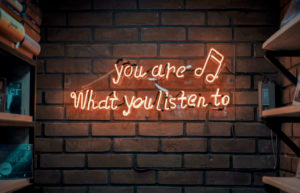It’s Music to my Ears

If you are looking for an easy way to transform your mood, cue the music.
Studies have shown that music can affect your mood and fend off depression. It can also improve blood flow in ways similar to statins, lower your levels of stress-related hormones like cortisol and ease pain. Listening to music before an operation can even improve post-surgery outcomes.
How can music have such a positive effect?
Music seems to selectively activate neurochemical systems and brain structures associated with positive mood, emotion regulation, attention and memory in ways that promote beneficial changes, ultimately changing the way you feel. Music is a part of everything we do – weddings, funerals, elevators and so much more. Music listening could boost mood, well-being and help stress-related measures in older adults suffering from cognitive decline.
It’s almost impossible to find someone who doesn’t feel a strong connection to music. Even if you can’t carry a tune or play an instrument, you can probably reel off a list of songs that evoke happy memories and raise your spirits. Surgeons have long played their favorite music to relieve stress in the operating room and extending music to patients has been linked to improved surgical outcomes. In the past few decades, music therapy has played an increasing role in all facets of healing.
So, you may ask…what is music therapy?
Music therapy is a burgeoning field. People who become certified therapists are usually accomplished musicians who have deep knowledge of how music can evoke emotional responses to relax, stimulate or help them heal. They combine this knowledge with their familiarity in a wide variety of musical styles to find the specific kind that can get you through a challenging physical rehab session or guide you into meditation. And they can find that music in your favorite genre, be it jazz or folk or whatever you respond to.
Music has been part of human life for thousands of years. Specifically, experts have found instruments dating back to over 40,000 years ago, suggesting that humans desire to express themselves or communicate through music is deep rooted. The use of music therapy and healing dates back to Ancient Greece, but its therapeutic use today began in the 20th century after World War II had ended. The earliest reference to music therapy comes from 1789 where it was used extensively to help people cope with their problems both physically and mentally.
The 1800’s saw medical research into the therapeutic nature of music grow, and by the 1940’s, universities were offering music therapy programs, bringing it to where it is today. Music therapy has been integrated in many fields around the world and music therapists work in private care, education, and social care. This field has gone through the roof, allowing simple music to be used in so many wonderful things associated with mankind.
One other interesting fact about music is that learning and practicing a piece of music can improve memory skills, coordination, reading, comprehension, and math skills. Additionally, it can also give lessons in responsibility and perseverance. On a personal note, l started taking guitar lessons to help myself cognitively and improve my memory pathways and hopefully try to avoid any future issues. Music can also introduce folks to many different cultures, and even have a romantic effect on people. Music and its effects have also been linked to helping depression and although it won’t cure it totally, it does have some amazing effects on those that are in a depressed phase. Studies suggest that music can improve symptoms of depression, with those undergoing music therapy along with standard treatments for depression improving more than people who only receive standard therapy. Listening to music can also release dopamine, and endorphins, which are hormones that can make people feel good, inducing happy moods and relieving pain.
Loud music can in some cases have a negative effect on you, especially your hearing if you are exposed to loud sound for a long period of time. This is most likely the only negative effect that music would have, however as l have said the positive things that music brings to one’s life, far outweighs the one negative. Music bonds people and is a powerful tool to express yourself in a safe way. Making music stimulates creativity and appeals to the imagination.
The notion that music can influence your thoughts, feelings and behaviors probably does not come as much of a surprise. If you’re ever felt pumped up while listening to your favorite tunes, then you easily understand the power of music to impact moods and even inspire action.
I can’t say enough good things about music and its effects on us. Whether you are sad or happy, there is always a place for music and its positive effects on us.
Vince Nigro/MS








Redes Sociais - Comentários